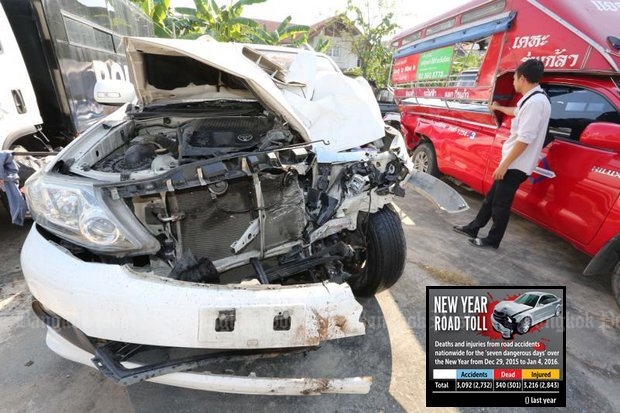
Thailand has still failed to curb high traffic fatalities as authorities admitted the New Year death toll would surpass last year's total despite a new measure to tackle drink-driving by temporarily seizing vehicles.
As of Jan 3, 340 deaths had been reported over six out of seven days designated as a period for campaigning to reduce road accidents during this year's New Year holiday, compared to 301 deaths reported during the same period last year, according to the Road Safety Centre.
In total, compared to the total so-called seven dangerous days in 2015, there were 341 deaths recorded.
National police spokesman Detnarong Sutthichanbancha said the lessons learned from the army's initial implementation of the vehicle seizure measure would be reviewed before possibly adopting it during the Songkran holidays in April.
From Dec 25 until Jan 3, 4,052 vehicles including 3,032 motorcycles were seized from drink-drivers. And on Sunday alone, 555 motorcycles were seized, according to the National Council for Peace and Order.

The high death toll from road accidents during the New Year holiday this year despite tougher preventive measures, particularly vehicle seizures, is mainly because of the higher number of travellers this year, said Pol Lt Gen Detnarong.
It is estimated that the number of people travelling by road during this New Year period surged to 3 million from only around 1 million in 2015, he said.
According to the World Health Organisaton (WHO), Thailand has the world's second-highest number of deaths from road accidents after Libya, with a death rate of 36.2 per 100,000 population. The global average is 17.5.
Prime Minister Prayut Chan-o-cha, meanwhile, admitted Monday that the tough measures had failed to bring down the number of road accidents.
He presumed that the root cause of the problem was due to drivers' habits and stressed the need to come up with better ways of raising public awareness on the importance of safe driving.
National police chief Chakthip Chaijinda, however, was optimistic that the vehicle-seizure measure would pay off in the long run.
He insisted that the measure should never have been regarded as an act that violated the rights of drivers because police took care of the seized vehicles from drink-drivers temporarily before returning them to their owners.
Thaejing Siripanich, secretary-general of the Don't Drive Drunk Foundation, was also optimistic, saying the introduction of this measure was successful in terms of raising public awareness by more than 70% about the dangers of drink-driving.
The government should never give up and should instead continue enforcing the measure throughout the year for a better outcome, he said.
He added that road accidents associated with drink-driving happen all the time, not only during holidays.
Each year more than 24,000 road accidents are associated with drink-driving, he said.
"No government has yet implemented so stringent a measure to tackle road accidents. So, I think this really is a good start," said the anti-drink-driving advocate.
Some experts blamed three key factors as to why the number of road accident fatalities still hover around 350 during long holidays, especially over the New Year period, he said.
They are substandard road conditions and unclear traffic signs, violations of traffic regulations, and poor enforcement of the law, he said.
An analysis by the Disaster Prevention and Mitigation Department showed the three most common factors attributed to the high rate of road accidents over the seven-day New Year period were drink-driving, speeding, and falling asleep at the wheel during long journeys, said Chatchai Phromlert, director-general of the department. Chanchao Chaiyanukij, permanent secretary for justice, said that his ministry was considering proposing additional measures to punish irresponsible drivers.
As for a proposal to extend the implementation of vehicle seizures, a new guideline for implementing this specific legal measure will be needed, he said.
During the recent New Year's implementation of the measure, law enforcement officials were allowed to determine when to seize and when not to seize a vehicle from a drink-driver, he said.
This could potentially lead to an abuse of authority if the measure is implemented all year long, he said.
A meeting was held Monday in Nakhon Ratchasima, where the highest number of New Year road accidents were reported.
Suthep Ruenthawil, head of the provincial disaster prevention and mitigation office, said after the meeting that drink-driving, speeding and traffic violations were the three major causes of 82 road accidents that left 15 killed and 76 people injured.